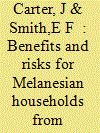| Srl | Item |
| 1 |
ID:
156764


|
|
|
|
|
| Summary/Abstract |
This research note discusses the benefits and risks for Melanesian households arising from attempts to increasingly commercialise Canarium indicum, an edible tree nut indigenous to Papua New Guinea, the Solomon Islands and Vanuatu. Qualitative data were generated during workshops and interviews with Canarium industry stakeholders about the impacts associated with a series of interventions designed to encourage further commercialisation of Canarium. The findings are organised according to three dimensions that elucidate the social implications of industry development for local communities: (i) income and growth; (ii) equity; and (iii) voice and choice. Broader distribution of benefits within and between countries, as well as among supply chain actors, requires a stronger policy response at regional (Melanesia) and national scales, equitable gender representation to avoid reinforcing existing inequalities, and delegation of decision-making power to the appropriate level to facilitate effective community participation and their links with other stakeholders. Thus, it remains to be seen whether Canarium-related benefits arising from its commercialisation can be sufficiently reliable compared with either other sources of income (e.g. existing employment opportunities for those located near urban areas) or utilising the resource for subsistence purposes.
|
|
|
|
|
|
|
|
|
|
|
|
|
|
|
|
| 2 |
ID:
166696


|
|
|
|
|
| Summary/Abstract |
This paper examines methodological avenues for a historical sociology of development through a close reading of Naomi Hossain’s recent book, The Aid Lab: Understanding Bangladesh’s Unexpected Success (2017). Hossain’s conjunctural perspective, the formative moment of Bangladesh in environmental catastrophe, war and famine in the 1970s, establishes a novel account of the country’s development trajectory. Contingencies of the moment and consequent political uncertainties committed an emergent national elite to a largely informal but substantive social compact against future crises of subsistence. The result was a specific, transnational power configuration rendering Bangladesh a test case for developmental interventions and the production of knowledge regarding them. Debates in critical development studies have often posited that such ‘elite commitment’ is a consequence and not so much a precondition for social improvement, brought about through struggles from ‘below.’ How might these positions be reconciled by shifting the temporal frames of reference? By rendering historical processes legible as conflicting and complementary interactions between different social forces and actors? How can such actors be envisaged without presuming their identities and interests as fixed or given, but rather, as shaping and being shaped by such processes? These questions motivate the immanent critique and reappraisal of Hossain’s timely work, highlighting its significance for dynamic analyses of historical capitalism today through the ‘universal particularities’ of the national case.
|
|
|
|
|
|
|
|
|
|
|
|
|
|
|
|